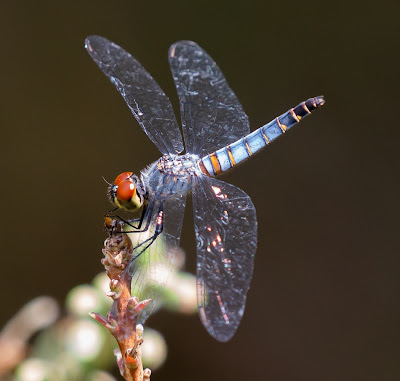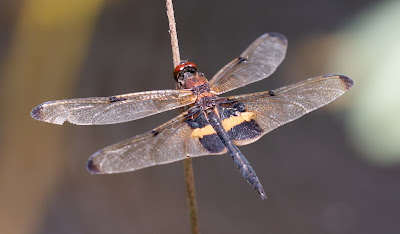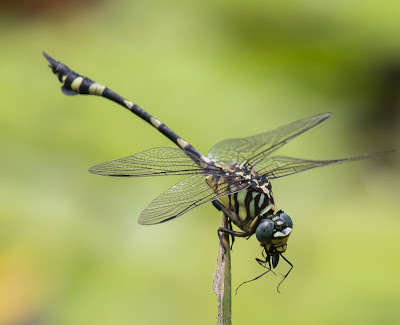For those of you who don't live in Australia we have had a wet summer. La Nina has been active and according to the news we've had the soggiest summer in 4-years. Figures have been bandied about but our little corner of SE Queensland has been very damp with some dam filling downpours and steady rain throughout. The effect on the Holt is very visible with green stuff shooting up all over. Unfortunately this has included the invasive weeds and I've been forced to put the backpack on a conduct some spraying. I dislike using poison for a variety of reasons but removing some weeds by hand just isn't feasible due to the need to get the entire root system.
 |
| Singapore Daisy |
Singapore Daisy is an attractive ground cover and popular with insects but it causes rashes on the dogs skin and will quickly take over if you don't deal with it.
 |
| Mother of Millions |
Mother of Millions is well named, a fleshy plant that spreads like wildfire and needs to be removed as soon as it appears.
 |
| Mistflower |
Another attractive groundcover which produces small flowers. It loves the banks of creeks and spreads quickly but care must be taken or the poisons can leech into the water.
On a far more positive note the lush foliage has attracted some of the rainforest birds down from the mountain and Whipbirds have been calling throughout the season. We've also had visits from a pair of Little Shrike-Thrush which is a first for the Holt.
 |
| Little Shrike-Thrush |
The Little Shrike-Thrush is a busy mid-sized insectivore that hops around in the mid-foliage searching for grubs. It's difficult to capture due to its frenetic activity, but the Whipbird is even harder.
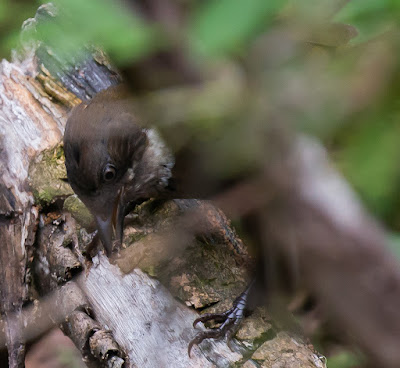 |
| Eastern Whipbird |
Whipbirds prefer the lower ground cover and will often search for food under fallen fern fronds and logs. They are a challenge to photograph and I can't say that I've ever managed a decent shot of one.
With the heat and humidity other critters have been abundant.
 |
| Golden Orb Spider |
Golden orb Spiders have been spinning their massive webs across the forest, trapping flying insects. This is a female with the far smaller (and out of focus) male sitting carefully distant above it. Their webs can stretch for 10m or more and are surprisingly strong and sticky.
 |
| Almost done! |
 |
| Mating Billabong Damselflies |
And here are the hosting lilies!
 |
| Water Snowflakes |
 |
| Marshwort |
Away from the dams the treetops have been noisy at nights as the Koalas have been growling out their mating calls. For a relatively small furry creature they can make surprisingly deep bellowing cries that can carry for a considerable distance.
 |
| A mid-morning doze after all the singing. |
The wet has also brought out the frogs, in numbers!
 |
| Graceful Treefrog climbing the window |
Meanwhile back at the ranch our turkeys have settled in nicely and Mildred (pictured) has recently gone broody and is sitting on a clutch of eggs.
 |
| Mildred |
and onto the birds....
Regulars
Australian Magpie
Bar-shouldered Dove
Brown Honeyeater
Brown Thornbill
Buff-rumped Thornbill
Bush Turkey
Cicadabird
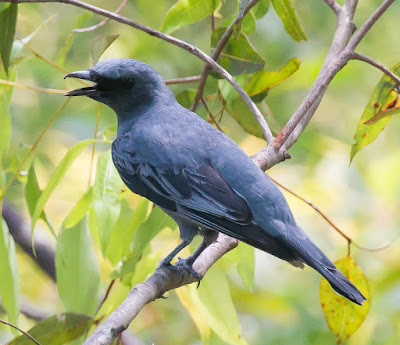 |
| Cicadabird |
Common Bronzewing
Dollarbird
Double-barred Finch
Eastern Spinebill
Forest Kingfisher
Galah
King Parrot
Laughing Kookaburra
Little Corella
Noisy Friarbird
Noisy Miner
Olive-backed Oriole
Pacific Black Duck
Peaceful Dove
Pied Butcherbird
Pied Currawong
Plumed Whistling Duck
Rainbow Lorikeet
Sacred Kingfisher
 |
Sacred Kingfishers
|
Scarlet Honeyeater
 |
| Scarlet Honeyeater |
Spangled Drongo
Striated Pardalote
Sulphur Crested Cockatoo
Torresian Crow
White-throated Gerygone
White-throated Honeyeater
Yellow-faced Honeyeater
Channel-billed Cuckoo
Eastern Yellow Robin
Golden Whistler
Grey Shrike-Thrush
Leaden Flycatcher
White-bellied Cuckoo Shrike
Willie Wagtail
Yellow-rumped Thornbill
 |
| Yellow-rumped Thornbill |
Uncommon (Seen occasionally)Black-faced Cuckoo Shrike
Crested Pigeon
Eastern Boobook
Eastern Whipbird
Figbird
Little Friarbird
Little Shrike-thrush
Little Wattlebird
Magpie Lark
Masked Plover
Pacific Baza
Pale-headed Rosella
Rainbow Bee Eater
Rufous Whistler
White-throated Treecreeper
Rare (Seen once)
Scaly-breasted Lorikeet
Yellow-tailed Black Cockatoo
and that's all for now folks!























































